100 Sentences with Could a detail lesson for Classroom
The word “could” is a great tool for talking about possibilities, polite requests, and past abilities. It helps make sentences sound more polite and helps us describe things that might happen or things we were able to do in the past.
Lesson Plan on “Could” for Kids
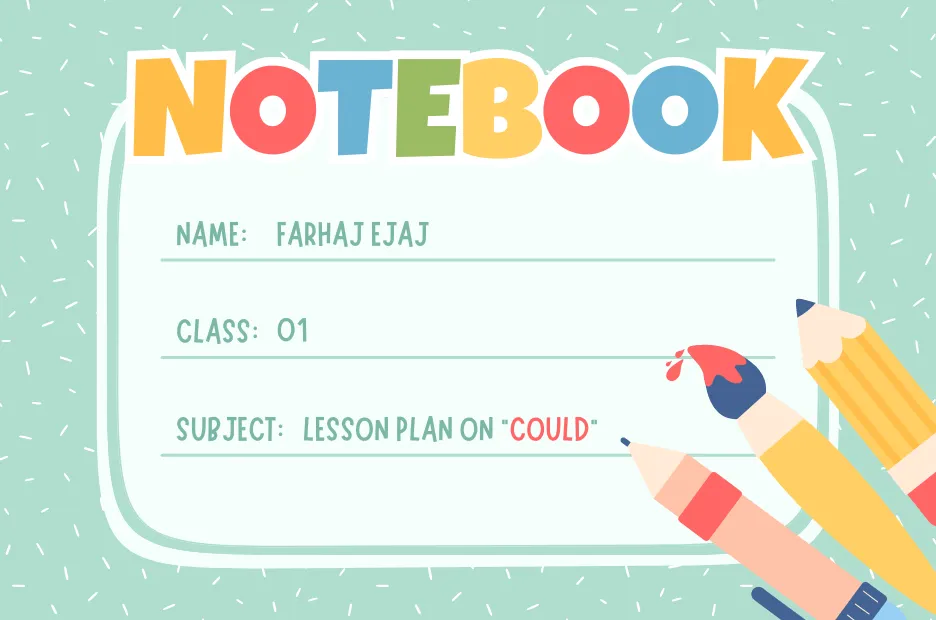
End of this lesson, you’ll know how to use “could” in your sentences and understand what it means. We’ll also look at how “could” is different from other words like “can” and “would.”
What Does “Could” Mean?
“Could” is a word that helps us talk about:
- Possibility: Something that might happen.
- Example: “It could rain tomorrow.”
- Ability in the Past: Telling someone what you were able to do before.
- Example: “When I was younger, I could run very fast.”
- Polite Requests or Suggestions: Asking someone to do something in a kind way.
- Example: “Could you help me with my homework?”
How “Could” is Different from “Can” and “Would”
Can is used when you are sure you or someone else is able to do something now.
Example: “I can swim.“
Could is used when you talk about the past or when you’re not sure about the present or future.
Example: “I could swim when I was five.“
Would is used to talk about something that is certain if a condition is met.
Example: “I would go to the park if it stopped raining.“
Where to Use “Could”
- To Show Possibility
- Example: “You could be right.”
- For Polite Requests or Suggestions
- Example: “Could I have some water, please?”
- To Talk About Past Abilities
- Example: “When I was little, I could do a cartwheel.”
Read More: Five Word Sentences for Kids: 152 Samples And Worksheet
Sentences With Could
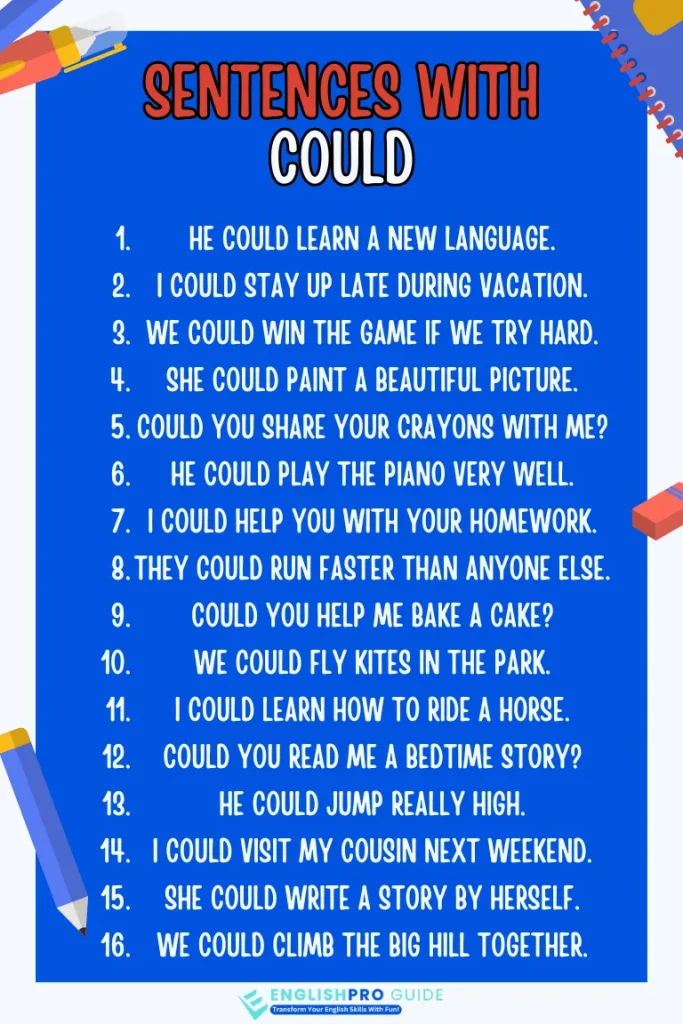
We have listed 100 sentences using Could. If you practice this sentences in regular basis your English
100 Sentences With ‘Could’ For Kids
- I could see the stars last night.
- Could you help me with this?
- When I was 5, I could ride a bike.
- It could rain later today.
- We could go to the zoo tomorrow.
- He could play the guitar when he was younger.
- Could I borrow your pencil?
- I could hear the birds chirping.
- The dog could smell food from far away.
- She could finish the puzzle by herself.
- Could you pass the salt, please?
- We could watch a movie tonight.
- He could be the tallest kid in the class.
- They could visit us next week.
- Could you help me clean my room?
- You could have called me.
- I could read when I was four.
- He could draw really well.
- Could you close the door?
- It could be sunny tomorrow.
- We could play outside if it stops raining.
- Could I go to the park after school?
- I could hear the rain falling on the roof.
- They could see the ocean from their window.
- She could run faster than anyone.
- Could you show me how to do that?
- I could come over later if you want.
- We could have ice cream after dinner.
- Could you tell me a story?
- He could lift heavy weights when he was younger.
- I could stay up late during the weekend.
- We could go to the beach tomorrow.
- Could you explain that to me again?
- It could get very cold at night.
- I could never understand that math problem.
- She could dance beautifully when she was young.
- Could you help me tie my shoes?
- The baby could sleep for hours.
- He could win the race if he trains hard.
- Could you pick me up after school?
- I could hear my mom calling me.
- We could go camping this weekend.
- He could sing very well.
- Could I have some more juice?
- She could swim across the lake.
- Could you open the window?
- It could be too late to catch the bus.
- I could bring my toy to show you.
- They could solve the puzzle together.
- Could you hold this for me?
- We could ride our bikes around the block.
- He could finish his homework by himself.
- She could help you if you ask nicely.
- I could find my way back home.
- We could play hide and seek.
- Could you help me carry these books?
- They could hear the music from far away.
- Could you lend me your eraser?
- He could reach the top shelf.
- I could bake cookies with my mom.
- Could you come to my party?
- We could take a walk in the park.
- She could be the next class president.
- Could you please be quiet?
- I could see a rainbow after the rain.
- He could play soccer all day.
- They could visit their grandparents next summer.
- Could you hand me that book?
- She could sing like a bird.
- I could run faster when I was younger.
- Could you save me a seat?
- He could finish the race if he tries.
- We could explore the forest.
- Could I have some water, please?
- I could carry my own backpack.
- She could dance all night long.
- Could you tell me the time?
- I could ride my scooter to the park.
- He could reach the top of the tree.
- We could build a fort with these pillows.
- Could you please turn off the lights?
- I could eat pizza every day.
- They could join us for the picnic.
- Could you find my lost toy?
- He could learn a new language.
- I could stay up late during vacation.
- We could win the game if we try hard.
- She could paint a beautiful picture.
- Could you share your crayons with me?
- He could play the piano very well.
- I could help you with your homework.
- They could run faster than anyone else.
- Could you help me bake a cake?
- We could fly kites in the park.
- I could learn how to ride a horse.
- Could you read me a bedtime story?
- He could jump really high.
- I could visit my cousin next weekend.
- She could write a story by herself.
- We could climb the big hill together.
Read More: Combining Sentences Using Subordinating Conjunctions
Are you teacher? Looking for lesson plan using ‘Could’
Teachers can use “could” in various ways to create interactive, engaging lessons that encourage critical thinking, creativity, and polite conversation.
Here’s a guide on how to structure a lesson using “could” in the classroom.
How Teachers Can Use “Could” in Lessons
- Introduce the Concept
Start by explaining what “could” means. Make sure students understand that “could” is used for:- Possibilities
- Polite requests
- Past abilities
- Suggestions
- “Today we’re going to learn a very special word: could. We use ‘could’ when we want to talk about something that might happen, to ask for things politely, or to talk about things we could do in the past.”
Create Scenarios Using “Could”
Give students hypothetical situations and ask them what they could do in those situations. This helps them think about possibilities and solutions.
Example Activity:
- Teacher: “Imagine you’re in a jungle. What are some things you could do?”
- Student: “I could climb a tree.”
- Teacher: “Great! What else could you do?”
- Student: “I could build a shelter.”
Polite Requests Using “Could”
Teach students how to use “could” in polite requests. This can help improve classroom manners and build communication skills.
Example Activity:
- Teacher: “If you need help in class, instead of saying, ‘Give me that,’ what could you say?”
- Student: “Could you help me with this?”
- Teacher: “Yes! Asking politely is always a good idea.”
“Could” for Problem-Solving Discussions
Use “could” to encourage students to think critically about problems. Create real-world problems, then have the students brainstorm solutions using “could.”
Example Activity:
- Teacher: “Let’s say there’s no playground at your school. What are some activities you could do during recess instead?”
- Student: “We could play board games.”
- Teacher: “Yes! What else could you do?”
- Student: “We could do art projects.”
Use “Could” to Discuss Past Abilities
Engage students in discussions about things they were able to do when they were younger but perhaps can no longer do as easily, or things they’ve learned over time.
Example Discussion:
- Teacher: “When you were younger, what are some things you could do that were easier for you?”
- Student: “I could crawl very fast when I was a baby.”
- Teacher: “That’s right! Now you can walk, which is even better.”
Teachers can use “could” in various ways to create interactive, engaging lessons that encourage critical thinking, creativity, and polite conversation. Here’s a guide on how to structure a lesson using “could” in the classroom.
How Teachers Can Use “Could” in Lessons
- Introduce the Concept
Start by explaining what “could” means. Make sure students understand that “could” is used for:- Possibilities
- Polite requests
- Past abilities
- Suggestions
- “Today we’re going to learn a very special word: could. We use ‘could’ when we want to talk about something that might happen, to ask for things politely, or to talk about things we could do in the past.”
- Create Scenarios Using “Could”
Give students hypothetical situations and ask them what they could do in those situations. This helps them think about possibilities and solutions.Example Activity:- Teacher: “Imagine you’re in a jungle. What are some things you could do?”
- Student: “I could climb a tree.”
- Teacher: “Great! What else could you do?”
- Student: “I could build a shelter.”
- Polite Requests Using “Could”
Teach students how to use “could” in polite requests. This can help improve classroom manners and build communication skills.Example Activity:- Teacher: “If you need help in class, instead of saying, ‘Give me that,’ what could you say?”
- Student: “Could you help me with this?”
- Teacher: “Yes! Asking politely is always a good idea.”
- “Could” for Problem-Solving Discussions
Use “could” to encourage students to think critically about problems. Create real-world problems, then have the students brainstorm solutions using “could.”Example Activity:- Teacher: “Let’s say there’s no playground at your school. What are some activities you could do during recess instead?”
- Student: “We could play board games.”
- Teacher: “Yes! What else could you do?”
- Student: “We could do art projects.”
- Use “Could” to Discuss Past Abilities
Engage students in discussions about things they were able to do when they were younger but perhaps can no longer do as easily, or things they’ve learned over time.Example Discussion:- Teacher: “When you were younger, what are some things you could do that were easier for you?”
- Student: “I could crawl very fast when I was a baby.”
- Teacher: “That’s right! Now you can walk, which is even better.”
- Writing Prompts Using “Could”
Ask students to write short stories or sentences using “could.” This encourages creative writing while reinforcing their understanding of the word.Example Prompts:- Write a story about what you could do if you had superpowers.
- Imagine you are on a desert island. What are three things you could do to survive?
- Think about the future. What jobs do you think you could do when you grow up?
- Games and Role Play Using “Could”
Create games where students must use “could” to solve challenges or act out scenarios.Example Role Play:- Set up a scenario where students have to pretend they’re lost in a forest. Ask them to tell the class what they could do to find help or stay safe.
- Have students pretend they’re at a restaurant. One student is the waiter, and the other is a customer asking for things politely using “could.”
- Student 1: “Could I have some water, please?”
- Student 2: “Yes, you could! I’ll bring it right away.”
Example Lesson Plan Using “Could”
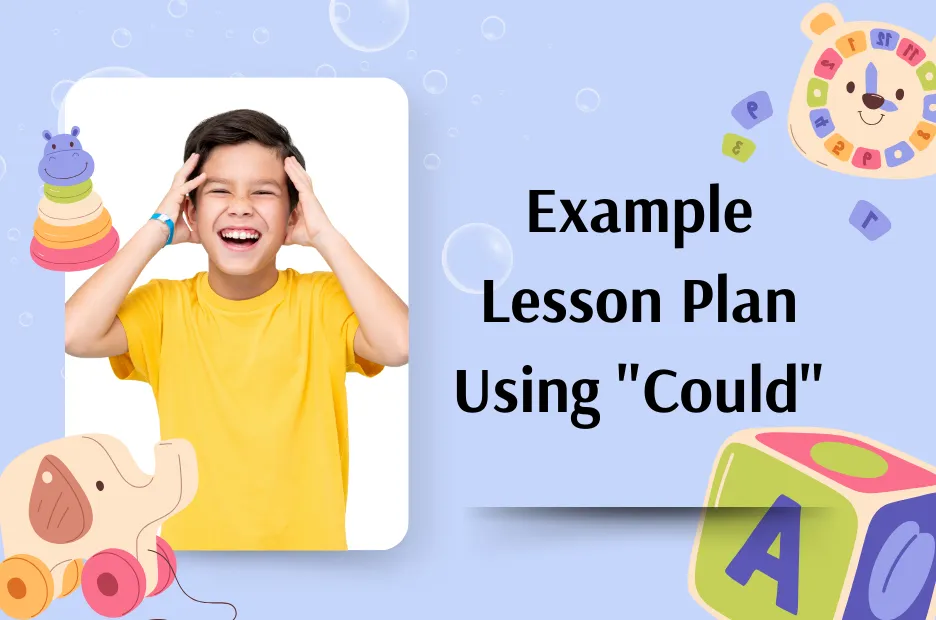
Objective:
Students will learn how to use “could” to express possibilities, make polite requests, and talk about past abilities.
Lesson Flow:
- Introduction (10 minutes):
- Briefly explain what “could” means. Use examples like “We could go to the park tomorrow” (possibility), “Could you help me with my homework?” (polite request), and “I could ride a bike when I was five” (past ability).
- Interactive Discussion (15 minutes):
- Present students with scenarios like “What could you do if it rains during recess?” or “What could you bring to a birthday party?” Encourage as many responses as possible, guiding students to think of creative answers.
- Polite Request Practice (10 minutes):
- Role-play polite requests using “could.” Students will take turns asking for classroom items (e.g., “Could I borrow a pencil?”). Reinforce polite responses.
- Problem-Solving Activity (10 minutes):
- Present a real-world or classroom-based problem. For example, “What could you do if there’s no internet at home?” Let students brainstorm solutions using “could.”
- Writing Activity (15 minutes):
- Ask students to write five sentences using “could” to talk about possibilities or past abilities. You can also assign a short story, such as “What could you do if you had a day off from school?”
- Wrap-Up and Review (10 minutes):
- Summarize what was learned in the lesson and go over a few more “could” sentences from the students’ writing. Encourage students to ask questions or share examples.
Ask students to write a paragraph about something they could do this weekend or a story about a dream adventure they could go on.
Conclusion
Using “could” in classroom lessons helps students develop language skills and explore creative thinking.
Teachers can integrate “could” into problem-solving, polite conversation practice, and storytelling activities to make lessons both fun and educational.

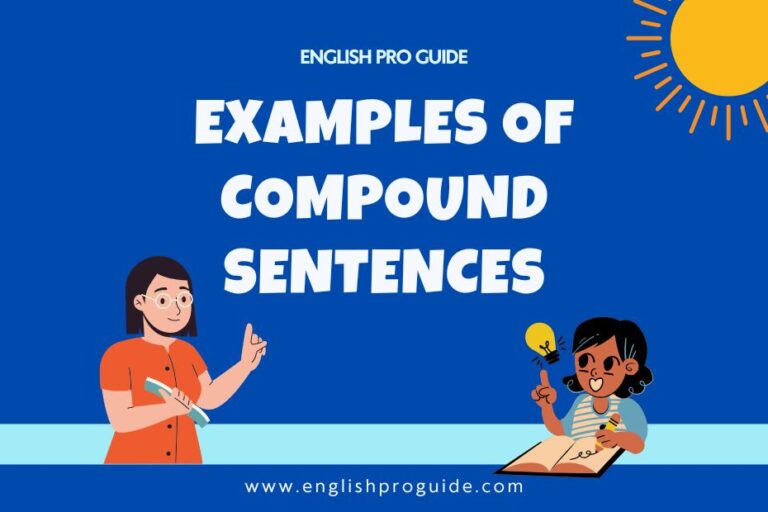
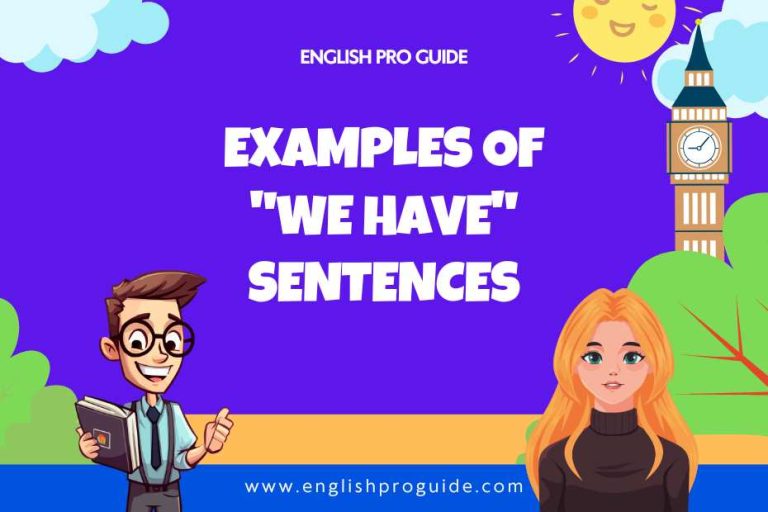
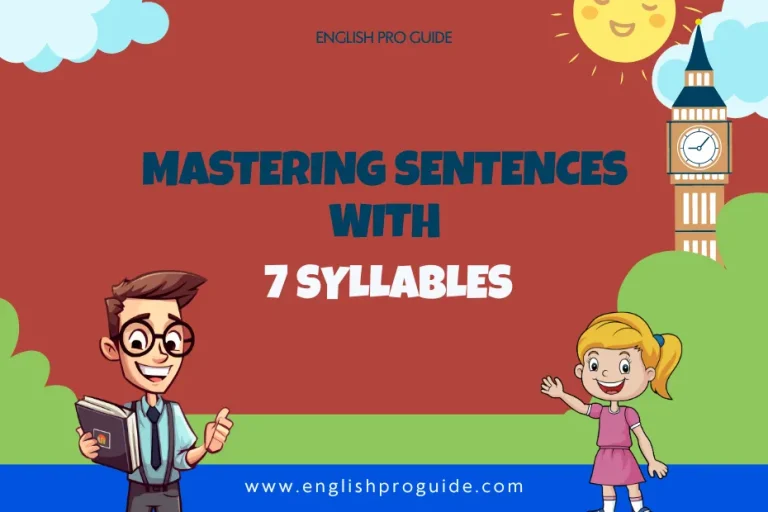
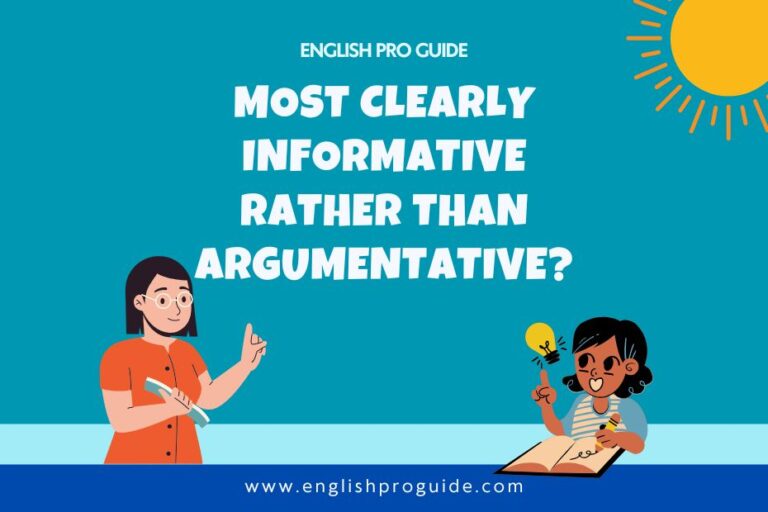
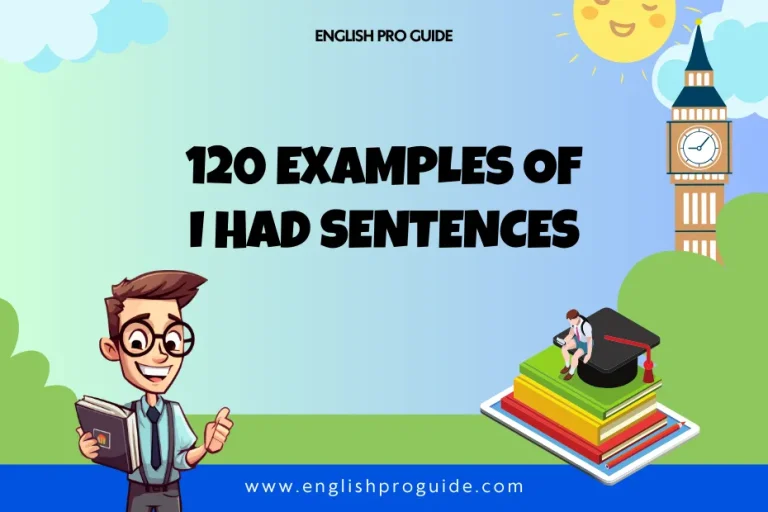

One Comment